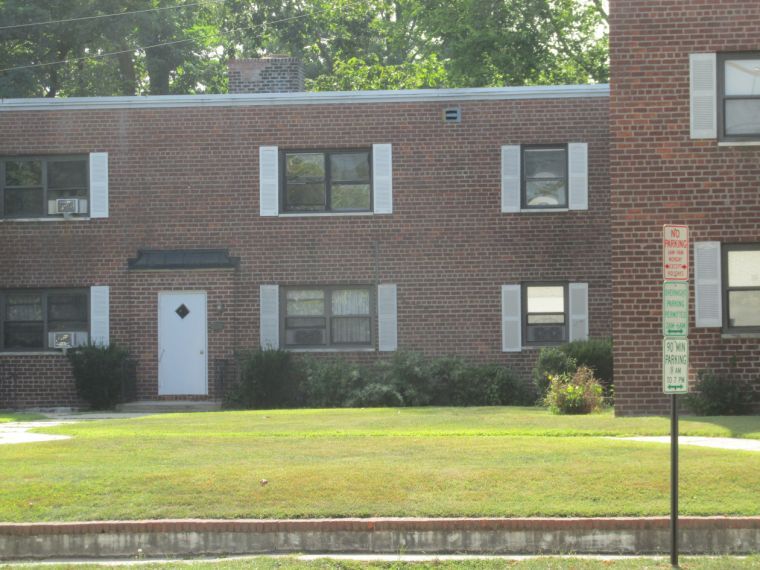
The owners of the Academy Gardens rent-stabilized apartment complex have submitted plans to demolish and rebuild market-rate units, sparking concerns and protest from the tenants association and its legal counsel.
The move comes six years after a similar effort that stalled over a request for zoning variances, and while the new plan does not require a variance, the owners will still be bound by state laws that protect residents whose rent-stablized apartments are torn down.
Attorney Fred Pollack, who represents Academy Gardens’ tenants, described the plan as greed-fueled and likely unable to meet state requirements to relocate tenants to comparable apartments within the community.
“[The owner] wants to knock down the building, throw the people out of their homes that they’ve lived in for decades, some of them, and make a lot of money,” Pollack said. “He’s been harassing the tenants for years to try to get them out, and he’s going to keep doing it.”
But the owners’ attorney, Paul Bloom, said the owners – who include developer and one time Kings Point resident David Adelipour – were dedicated to meeting their legal responsibilities and suggested tenants could eventually move back to the revamped complex once construction is complete.
“[The tenants] want to be living in a brand new building for the next couple of decades at no change in their rental,” Bloom said. “I don’t understand where there would be an adverse impact. They’re going to be asked to relocate on a temporary basis at the landlord’s expense to substantially upgraded housing.”
Pollack expressed doubt that the owners could meet the state requirements for demolition of rent-stabilized housing, which include relocating residents to comparable apartments “in a closely proximate area” or suitable interim housing if residents are to move into the updated building after construction. The owners would also be required to cover the difference in tenants’ rent costs for six years.
“I don’t think he can find apartments. I think this is a fool’s chase,” Pollack said.
Such concerns are unfounded, argued Bloom, who said the owners intend to allow tenants to return to the building once construction is complete. Bloom said discussion of any specific relocation plans would be premature, and that a plan would be released once the project enters its later stages.
The complex, which sits on the corner of Steamboat and Middle Neck roads, is a stretch of connected brick buildings whose rent stabilized units have housed some of the peninsula’s middle-class residents for decades.
The revival of the demolition plan has some residents and the developers squaring off on old battle lines, with the Village of Great Neck caught in the middle and possessing little legal recourse to oppose the project, according to Village of Mayor Ralph Kreitzman.
About a dozen tenants attended the Village of Great Neck’s board meeting Tuesday night, as tenant association president Julia Shields voiced concerns about the project’s impact on residents.
In a phone interview last week, Bloom described the village approval process for the three-story building plan as “simple.”
Kreitzman said in an interview that while he was concerned about the effect on residents the village’s role is limited to a site plan review by the planning board.
“[The planning board’s] process is a very objective process to see it complies with those features,” he said. “They don’t have the right to just say yes or no to a process.”
Kreitzman, who criticized the demolition in 2007, again voiced support for tenants but portrayed the decision as in the state’s hands.
“I’m very concerned. These are good citizens and I’m very concerned about that,” Kreitzman said.
Those citizens, said Shields, are largely middle-class workers who have lived in the apartments for decades and made careers at Great Neck institutions including the Great Neck Public School system, the Great Neck library and the U.S. Merchant Marine Academy in Kings Point.
“Everybody that’s there is working class,” said Shields, who has lived in Academy Gardens since 1965. “Most of them have now been there since the ‘70s.”
The complex is also predominantly black and Hispanic – a rarity among housing developments in the Great Neck peninsula.
Shields said tenants had not been formally notified of the demolition plan, and that she had first found out about the proposal from a tenant who picked up the news in a grocery aisle conversation with a neighbor.
“We didn’t even know they had gone to the planning board to make this presentation.” Shields said. “We know nothing from them.”
Shields also alleged the management of the complex had “harassed” residents into leaving and offered money in exchange for tenants vacating their apartments, dating back to the 1990s.
The plan has been discussed at one planning board meeting, and will be subject to another hearing in October, Kreitzman said.






